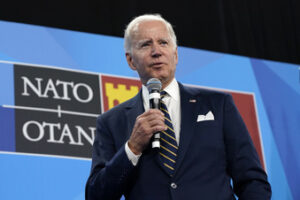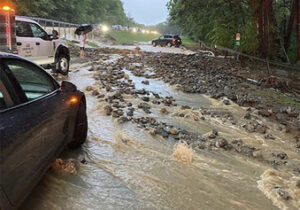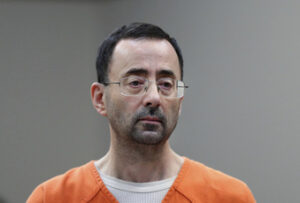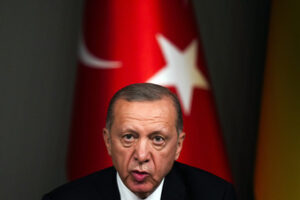Putin: Call-up of Russian reservists to finish in 2 weeks
5 min read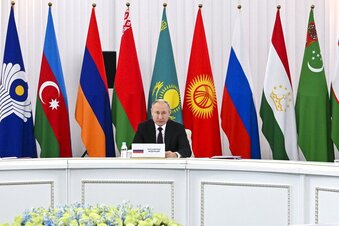
Russian President Vladimir Putin speaks at the Summit of the Commonwealth of Independent States (CIS), in Astana, Kazakhstan, Friday, Oct. 14, 2022. (Ramil Sitdikov, Sputnik, Kremlin Pool Photo via AP)
KYIV, UKRAINE (AP) — Russian President Vladimir Putin said Friday he expects a mobilization of army reservists he ordered to bolster his country’s troops in Ukraine to be completed in two weeks, a milestone that would allow him to end the unpopular call-up as the Kremlin tries to counter Ukrainian gains on the battlefield.
After attending a summit in Kazakhstan of regional leaders from Asia and eastern Europe, Putin told reporters he does not regret starting the conflict with Russia’s neighbor and “did not set out to destroy Ukraine” when he sent troops into the country nearly eight months ago.
“What is happening today is unpleasant, to put it mildly,” he said. “But we would have had all this a little later, only under worse conditions for us, that’s all. So my actions are correct and timely.”
In his comments on the army mobilization, Putin said the call-up he ordered last month had registered 222,000 of the 300,000 reservists the Russian Defense Ministry set as an initial goal. A total of 33,000 of them are already in military units, and 16,000 are involved in combat, he said.
The call-up, announced by Putin as his forces lost ground to a Ukrainian counteroffensive that inflicted a stunning blow to Moscow’s military prestige, aroused public discontent in Russia, where almost all men under the age of 65 are registered as reservists.
At the same time, Putin’s own supporters have criticized the Kremlin’s handling of the war, increasing pressure on him to do more to turn the tide in Russia’s favor.
Despite Putin and other top officials stating the mobilization would affect some 300,000 people, the decree the president signed to get the draft going did not mention a specific number. Russian media reports have suggested the actual number could be as high as 1.2 million reservists.
Putin initially described the mobilization as “partial” and said only those with combat or service experience would be drafted. In the wake of his order, tens of thousands of men left Russia. The Russian leader has since acknowledged that men without the relevant experience or ineligible for service for medical reasons were called to active duty.
Reports also have surfaced since then of recruits getting deployed to the front lines in Ukraine with little training and inadequate equipment. Several mobilized reservists were reported to have died in combat in Ukraine this week, just days after they were drafted.
Putin said all activated recruits should receive adequate training and that he would assign Russia’s Security Council “to conduct an inspection of how mobilized citizens are being trained.”
Before launching the invasion on Feb. 24, Putin questioned Ukraine’s right to exist as a sovereign nation, portraying the country as part of historic Russia. Asked about this on Friday, he repeated his claim that Russia was prepared for peace talks and the government in Kyiv was to blame for the lack of negotiations.
“We even reached certain agreements in Istanbul (in the spring),” Putin said, thanking Turkish President Recep Tayyip Erdogan for his mediation efforts. “These agreements were actually almost initialed. But, as soon as the (Russian) troops withdrew from Kyiv, the Kyiv authorities immediately lost the desire to negotiate.”
Ukraine officially rejected any possibility of negotiating with Putin after he illegally annexed Ukraine’s Kherson, Zaporizhzhia, Donetsk and Luhansk regions as Russian territory last month following “referendums” that Kyiv and the West denounced as a sham.
The war’s momentum has shifted toward Ukraine as its military pursues counteroffensives in the invaded country’s east and south. The Kherson region’s Moscow-installed leader asked the Kremlin on Thursday to organize an evacuation from four cities, citing incessant shelling by Ukrainian forces.
Russia promised free accommodation to Kherson residents who want to evacuate to Russia, a sign that Ukrainian military gains along the war’s southern front were worrying the Kremlin.
Vladimir Saldo, the head of the Moscow-appointed regional administration, said a decision was made to evacuate Kherson residents to the Russian regions of Rostov, Krasnodar and Stavropol, as well as to the Crimean Peninsula, which Moscow annexed from Ukraine in 2014.
“We, residents of the Kherson region, of course know that Russia doesn’t abandon their own, and Russia always offers a hand,” Saldo said.
Russia has characterized the movement of Ukrainians to Russia or Russian-controlled territory as voluntary, but in many cases those are the only evacuation routes residents of occupied areas can or are allowed to take.
Reports have surfaced that some Ukrainians were forcibly deported to “filtration camps” with harsh conditions. In addition, an Associated Press investigation found that Russian officials deported thousands of Ukrainian children – some orphaned, others living with foster families or in institutions – to be raised as Russian.
The evacuation announcement came as Ukrainian forces pushed deeper into the Kherson region, albeit at a slower pace than a few weeks ago. Ukrainian forces reported retaking 75 populated places in the region in the last month, Ukraine’s Ministry for Reintegration of Temporarily Occupied Territories said late Thursday night.
A similar campaign in eastern Ukraine resulted in most of the Kharkiv region returning to Ukrainian control, as well as parts of the Donetsk and Luhansk regions, the ministry said.
Gen. Valeriy Zaluzhny, the commander of Ukraine’s armed forces, vowed Friday that his forces would succeed in “getting ours back.”
“No one and nothing will stop us,” Zaluzhny said in a video message. “We have buried the myth of the invincibility of the Russian army.”
Friday was Defender’s Day in Ukraine, but celebrations were muted because of the war. For a fifth day, Russia continued missile strikes on critical infrastructure that started Monday in retaliation for an Oct. 8 truck bomb explosion on a prized bridge linking Russia to annexed Crimea.
The explosion temporarily halted rail and road traffic on the 12-mile-long Kerch Bridge, undermining a vital supply route for the Kremlin’s forces. Russia’s Federal Security Service said Wednesday it had identified 12 suspects, citizens of Armenia, Russia and Ukraine.
Russia’s retaliatory strikes, which Ukrainian authorities said killed dozens of Ukrainians this week, killed at least more nine civilians between Thursday and Friday, the Ukrainian president’s office said. The victims included an 11-year-old boy and six other people who died after a missile strike in the city of Mykolaiv, where a residential building was destroyed, the regional governor, Vitaliy Kim, said.
Russian forces on Friday carried out missile strikes on Kharkiv, Ukraine’s second- largest city, and in the Zaphorizhzhia region, home to Europe’s biggest nuclear power plant. The U.N.’s nuclear watchdog has repeatedly warned that fighting at or near the Russian-controlled Zaphorizhzhia Nuclear Power Plant could trigger a potentially catastrophic release of radiation.
Putin has vowed to retaliate harshly if Ukraine or its allies strike Russian territory, including the annexed regions of Ukraine. Russian officials reported Friday that Ukrainian shelling blew up an ammunition depot in Russia’s Belgorod region on the border with Ukraine.
An unspecified number of people were killed and wounded in the incident, according to Russia’s Investigative Committee. Unconfirmed media reports said three Russian National Guard officers were killed and more than 10 were wounded.


